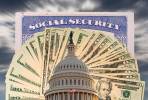Editorial: Who’s deceiving whom?
As we noted last week, the Nevada Supreme Court on Wednesday dug the grave for efforts to kill the state’s new commerce tax when it declared that signatures gathered in an effort to overturn the tax through a referendum on the November ballot were invalid.
The court unanimously held that the group collecting the signatures, RIP Commerce Tax, failed to adequately inform voters that repealing the tax — slated to bring in $60 million a year —would affect the state budget.
Justice Nancy Saitta even felt compelled to write a short, concurring opinion claiming that those who signed the petition were “both deceived and misled,” because the petition’s signature collectors failed to warn them of the doom and gloom that tax supporters predict will befall the state it the levy is nullified.
The opinion was unfortunate and misguided.
In reality, Nevada taxpayers are the ones being “both deceived and misled” by those who argue that blocking the commerce tax would be a catastrophe for the state. And they’ve been deceived and misled by lawmakers who find it easier to treat Nevada’s businesses like ATMs rather than prioritize spending based on available revenues.
The commerce tax will soon force business owners with more than $4 million in annual revenues to determine which of the tax’s 26 different rates applies to them, and then write the state a check accordingly. Because of its structure, the commerce tax could threaten job growth and make the state less attractive to new businesses.
But in terms of a revenue source, it’s a pittance. Over the two-year budget cycle, the $120 million the new tax is projected to generate amounts to just 1.6 percent of the state’s record $7.3 billion spending blueprint. Cutting $60 million a year from the state budget is the equivalent of an individual earning $40,000 annually tightening his belt by about $12 a week.
Gov. Brian Sandoval and other tax supporters argue that money from the commerce tax will be invested in K-12 education to help “the children.” Fine. But absent that additional revenue, nothing prevents lawmakers from better prioritizing their spending decisions to ensure the state’s educational system is a top priority and funded accordingly.
Those behind the repeal effort were being neither deceptive nor misleading by failing to include language describing — in the court’s words — the “significant practical ramifications” of overturning the tax. They were being truthful. It’s difficult to find any harmful effects to report.
Without the commerce tax, lawmakers and other state officials would simply be forced to prioritize education and to spend tax dollars more efficiently — two things that would benefit both the state government and the citizens who fund it.























